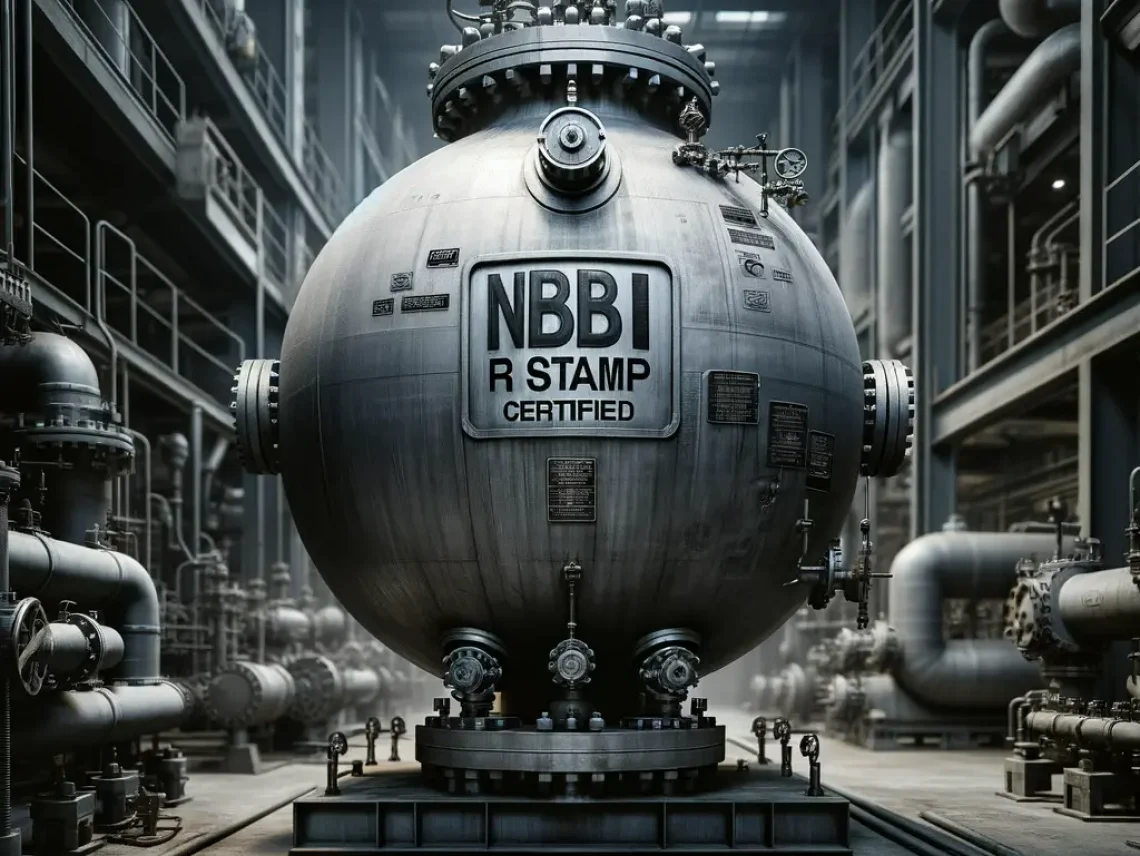
Table of Contents
ToggleIn industrial safety and compliance, being R Stamp Certified means your business is authorized by the National Board of Boiler and Pressure Vessel Inspectors (NBBI) to perform repairs and alterations on pressure vessels and boilers under the rigorous National Board Inspection Code (NBIC). This certification signals uncompromising quality, ensuring the integrity and safety of equipment in critical applications.
The R Stamp differs from the U Stamp, which covers the manufacturing of new pressure vessels, while the R Stamp specifically addresses repair and alteration work—both governed by ASME codes as detailed in our comparison of R and U Stamps. If you’d like to explore the specific requirements organizations must meet to become certified, check out our related guide on R Stamp requirements in detail.
Industries that rely heavily on high-pressure equipment—such as oil and gas, power generation, and biogas—demand R Stamp certification for repairs and alterations involving pressure-retaining equipment. Safety and regulatory compliance are paramount; if you’re working in these sectors, our overview of R Stamp applications in oil and gas provides excellent context.
Being R Stamp Certified delivers key advantages:
Enhanced safety and risk mitigation: Certified repairs follow exacting standards, minimizing equipment failure.
Market credibility: Displaying the R Stamp elevates your professional image.
Competitive edge: Certification often unlocks access to tenders and partnerships that require proof of compliance.
Being R Stamp Certified delivers key advantages:
Enhanced safety and risk mitigation: Certified repairs follow exacting standards, minimizing equipment failure.
Market credibility: Displaying the R Stamp elevates your professional image.
Competitive edge: Certification often unlocks access to tenders and partnerships that require proof of compliance.
For a deeper dive into what the R Stamp enables organizations to do—and why it’s crucial—you can reference this informative guide from HB McClure Company on why your boiler service provider should be R Stamp certified or review the official National Board R Certificate of Authorization requirements and audit process
| Stamp Type | Purpose | Applies To |
|---|---|---|
| R Stamp | Repair & alteration approval | Existing pressure vessels/boilers |
| U Stamp | Manufacturing certification | New pressure vessels |
Though both adhere to ASME standards, they serve distinct roles in the lifecycle of industrial equipment—manufacturer vs. repairer. Get a side-by-side view via our R vs. U Stamp breakdown.
Red River is a trusted R Stamp Certified provider, delivering safe and compliant pressure vessel repairs and alterations. Learn more about our experience and process in our comprehensive R Stamp guide.
For broader context on pressure vessels and their importance in industry, explore our foundational overview on Pressure Vessels: Basics and Their Critical Importance.
To sum up, being R Stamp Certified is more than a credential—it’s a testament to your company’s commitment to safety, quality, and professionalism. This certification bolsters trust, unlocks new business opportunities, and ensures compliance in industries where failure is not an option.
It means your organization is authorized by the NBBI to conduct repairs and alterations on pressure-retaining equipment following the NBIC, ensuring each job meets the highest safety and quality standards.
Companies that perform repairs on boilers, pressure vessels, or piping systems in regulated industries—such as oil and gas, power generation, or biogas—should become R Stamp Certified.
The R Stamp is for repairs and alterations, while the U Stamp applies to the manufacturing of new pressure vessels—both of which follow ASME standards.
R Stamp certification requires periodic renewal through NBBI inspections and audits to ensure commanders remain compliant over time.
It assures that repairs and alterations are up to NBIC standards, reducing the risk of equipment failure and maintaining regulatory compliance.
Definition: R Stamp Certified means authorized repairs per NBIC.
Industries: Essential in high-risk sectors like oil & gas and power.
Benefits: Safety, credibility, compliance, and competitive advantage.
Process: Documentation, facility audit, and periodic renewals.
Stamp Types: R for repairs, U for manufacturing.
Partner with Red River: Trusted, certified, and ready to support your most critical projects.
Table of Contents
ToggleIn the realm of industrial solutions, Red River emerges as a pioneer, offering a diverse range of custom-engineered products and facilities. Among our specialties is the design and production of Custom/OEM Pressure Vessels, meticulously crafted to meet individual client requirements, ensuring performance under various pressure conditions. Our expertise extends to the domain of prefabrication, where Red River leads with distinction.
The company excels in creating prefabricated facilities, modules, and packages, reinforcing its stance as a forerunner in innovation and quality. This proficiency is further mirrored in their Modular Skids offering, where they provide an array of Modular Fabricated Skid Packages and Packaged equipment. Each piece is tailored to client specifications, underlining their commitment to delivering precision and excellence in every project they undertake.